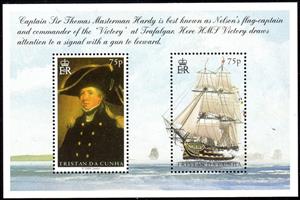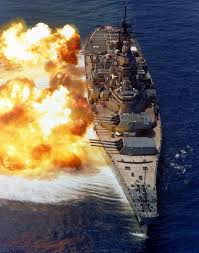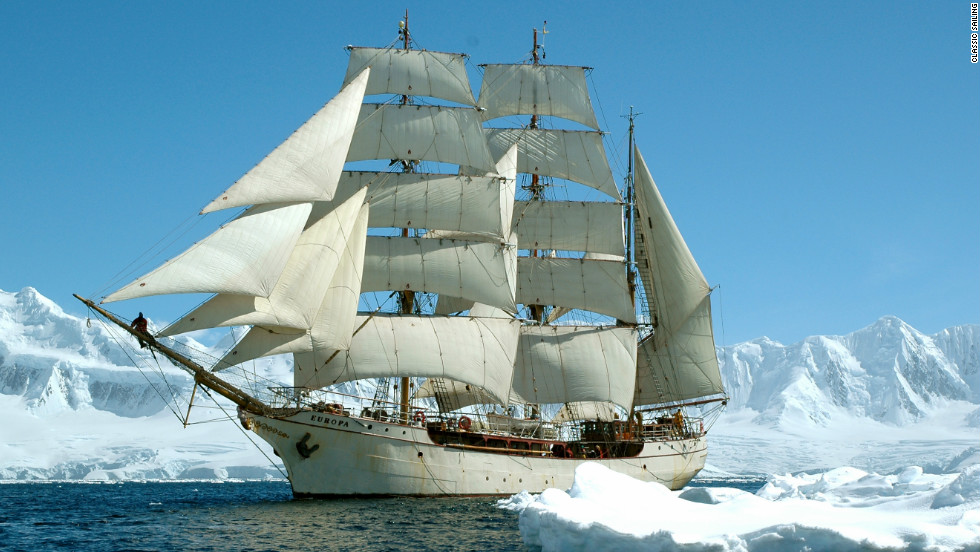Souvenir Sheet: HMS Victory (Tristan da Cunha 2005)
HMS Victory (Tristan da Cunha 2005)
20 January (Tristan da Cunha ) within release 200th ann. of the naval battle of Trafalgar (I) goes into circulation Souvenir Sheet HMS Victory face value 2*75 British penny
| Souvenir Sheet HMS Victory in catalogues | |
|---|---|
| Yvert et Tellier: | Yt: TA BF46 |
| Stanley Gibbons: | Sg: TA MS817 |
Souvenir Sheet is horizontal format.
Also in the issue 200th ann. of the naval battle of Trafalgar (I):
- Stamp - HMS Royal Sovereign face value 20;
- Stamp - HMS Victory face value 35;
- Stamp - HMS Victory face value 60;
- Souvenir Sheet - HMS Victory face value 2*75;
- Stamp - Nelson's Quadrant face value 15;
- Stamp - Portait of Admiral Nelson face value 50;
- Stamp - Thomas Swain Aids the Wounded Nelson face value 25;
Souvenir Sheet HMS Victory it reflects the thematic directions:
Admiral is the rank, or part of the name of the ranks, of the highest naval officers. It is usually abbreviated to "Adm" or "ADM". The rank is generally thought to have originated in Sicily from a conflation of Arabic: أمير البحر, amīr al-baḥr, "commander of the sea", with Latin admirabilis ("admirable") or admiratus ("admired"), although alternative etymologies derive the word directly from Latin, or from the Turkish military and naval rank miralay. In the Commonwealth and the U.S., a "full" admiral is equivalent to a "full" general in the army, and is above vice admiral and below admiral of the fleet (or fleet admiral). In NATO, admirals have a rank code of OF-9 as a four-star rank.
An anniversary is the date on which an event took place or an institution was founded in a previous year, and may also refer to the commemoration or celebration of that event. For example, the first event is the initial occurrence or, if planned, the inaugural of the event. One year later would be the first anniversary of that event. The word was first used for Catholic feasts to commemorate saints. Most countries celebrate national anniversaries, typically called national days. These could be the date of independence of the nation or the adoption of a new constitution or form of government. The important dates in a sitting monarch's reign may also be commemorated, an event often referred to as a "Jubilee".
Famous People refers to the fame and public attention accorded by the mass media to individuals or groups or, occasionally, animals, but is usually applied to the persons or groups of people (celebrity couples, families, etc.) themselves who receive such a status of fame and attention. Celebrity status is often associated with wealth (commonly referred to as fame and fortune), while fame often provides opportunities to make money.
Naval warfare is combat in and on the sea, the ocean, or any other battlespace involving a major body of water such as a large lake or wide river.
A modern sailing ship or sailship is any large wind-powered vessel. Traditionally a sailing ship (or simply ship) is a sailing vessel that carries three or more masts with square sails on each. Large sailing vessels that are not ship-rigged may be more precisely referred to by their sail rig, such as schooner, barque (also spelled "bark"), brig, barkentine, brigantine or sloop. There are many different types of sailing ships, but they all have certain basic things in common. Every sailing ship has a hull, rigging and at least one mast to hold up the sails that use the wind to power the ship. The crew who sail a ship are called sailors or hands. They take turns to take the watch, the active managers of the ship and her performance for a period. Watches are traditionally four hours long. Some sailing ships use traditional ship's bells to tell the time and regulate the watch system, with the bell being rung once for every half hour into the watch and rung eight times at watch end (a four-hour watch). Ocean journeys by sailing ship can take many months, and a common hazard is becoming becalmed because of lack of wind, or being blown off course by severe storms or winds that do not allow progress in the desired direction. A severe storm could lead to shipwreck, and the loss of all hands. Sailing ships are limited in their maximum size compared to ships with heat engines, so economies of scale are also limited. The heaviest sailing ships (limited to those vessels for which sails were the primary means of propulsion) never exceeded 14,000 tons displacement. Sailing ships are therefore also very limited in the supply capacity of their holds, so they have to plan long voyages carefully to include many stops to take on provisions and, in the days before watermakers, fresh water.





